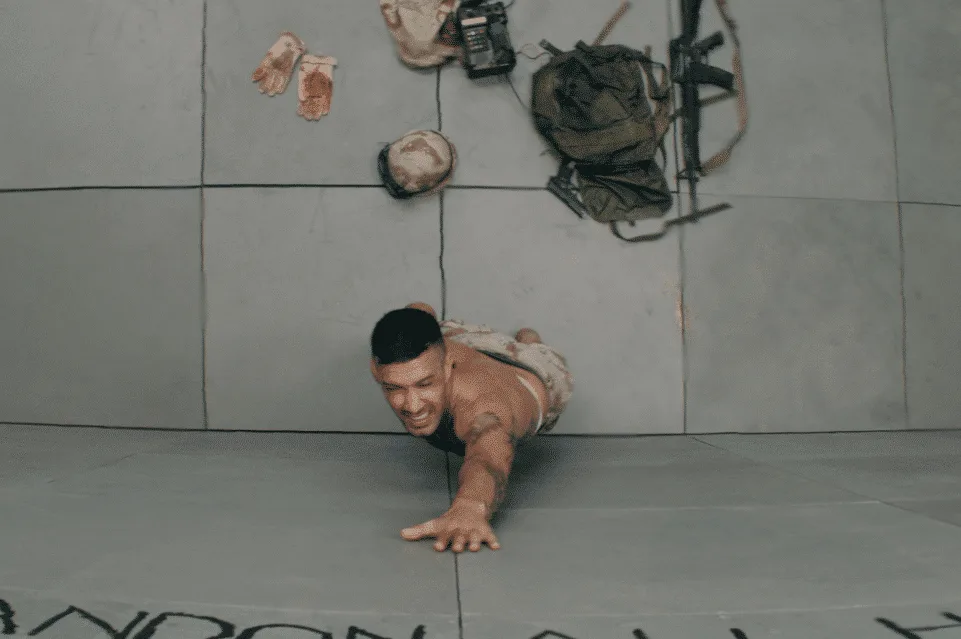
The Abandon gives itself an immense amount of work to do; it has sci-fi elements, but it couples these with something akin to an ordeal horror in places. But then, it adds elements of human drama too – elements which become steadily more important as the film progresses. All in, it’s a challenging watch which could be seen as overly ambitious by some, but it deserves credit for pushing itself so hard to bring something quite unlike other films together in one place. Some elements of this kind of existential style have been explored elsewhere, but never quite like this, and it’s hard not to invest in seeing it through to the end.
The First Gulf War – 1991. As a small contingent of American soldiers try to regroup and to survive the night during an ill-fated operation, one of them gets separated from the small number of survivors and finds himself lying, peaceful for a moment, watching the sky. It turns out that what Pt. Miles Willis is trying to focus his eyes on isn’t a US air attack, or anything recognisable. A bright light passes over him; he loses consciousness.
The next thing he knows, he awakens in a sealed cell of some kind. Pulling himself to his feet, his gunshot wound continuing to bleed out, he attempts to explore this new environment. It seems hopeless – the walls are featureless, there’s no discernible exit, or any sense of who has locked him in there. Things get stranger when he sees something etched into one of the walls; in fact, there’s more than one piece of writing here. The cell seems to be a puzzle of some sort, where the rules of physics can be broken and conventional means of communication seem to be off-limits. Or, are they? His satellite phone begins to ring. If he’s a rat in a maze, it seems he’s not completely isolated in it, and when he can answer the call, he begins to work with the woman on the line to try and deduce what is happening to them.
The Abandon could easily have been hamstrung by its chosen elements – a cast of (largely) one person, in a small, closed-off set – as these each beg extra scrutiny from an audience which has no distractions from other characters, events or vistas to draw the eye. One of the ways in which The Abandon survives all of that is via lead actor Jonathan Rosenthal’s performance here. He starts entirely plausibly as a military grunt more equipped for shooting at targets than dealing with more philosophical issues; he looks confused and ill at ease and at first, tries to overcome everything which the situation throws at him by throwing extra testosterone at it. He does change, but the initial awkwardness of watching him simply hurling his weight around is suitably awkward; it’s also worth pointing out that The Abandon is a (perhaps surprisingly) physical role, and some of the ordeals which Willis goes through are gruelling – hence the early reference to ordeal horror above. There really are similarities. So it’s brutal, but yet it seems choreographed, or at least heavily stylised whenever this kind of brutality is going on: overall, it’s an unusual style of viewing experience, and again it deserves credit for layering something like this together. It’s an attractive looking film with enough variety in camerawork to open up its confined space. Viewers may be able to guess at where one of the more scientific elements may be heading, and many may well feel that the added discussions of back stories and character motivations flesh out the more abstract aspects of the plot.
Likewise, these kinds of restricted-set films can be tough to pace appropriately. The Abandon is most of the way there, though the first half of the film is more successful at carefully doling out enough details to keep the plot moving, establishing the mystery to come. Things get a little more uneven as the film heads towards its closing act however, and some of the exposition could have been handled differently, though it keeps a few tricks up its sleeve, and it’s rewarding to finally get there: it also shows that it has no intention of answering every question we may have. This is certainly a different spin on a genre which has come to be rather predictable in some aspects: director Jason Satterlund has dodged this predictability successfully.
The Abandon (2022) has been chosen to close the Mammoth Film Festival on February 6th, 2022 (world premiere).



